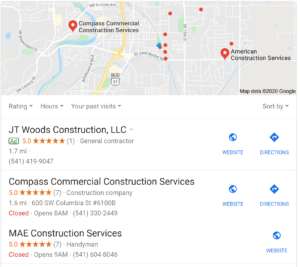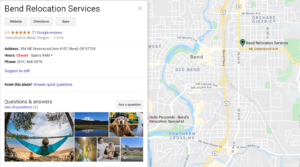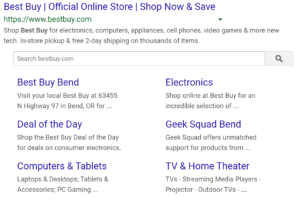In today’s competitive landscape, ranking for local search queries can be tough – even more so if you’re competing in a rapidly growing market, like Central Oregon.
However, ranking locally can help you get discovered for relevant queries, attract highly targeted traffic to your website, and even result in more walk-in customers.
Continue reading to learn about how you can leverage local SEO tactics to compete in Central Oregon – one of the hottest entrepreneurial regions in the US – and gain the upper hand against hundreds of businesses.
Let’s get started.
Understanding Local SEO – What is it?
Local SEO encompasses all of the efforts a business makes to improve its rankings on SERPs for search queries with local intent, such as “restaurants in Bend” or “Spas in Central Oregon,” etc.
The goal is to outrank other businesses located within the same geographical domain as yours, rather than compete globally, by landing in the local packs.
What are Local Packs and Why Are They Important for Local SEO?
A local pack is a SERP feature that is triggered when there is local intent behind a search query. It lists 3 businesses at the top of the very first SERP, along with detailed information.
Here’s an example of a local pack for the search query “construction services in Bend”:

These are the businesses that Google deems fit to answer the location-specific search, after considering several local ranking factors.
Ultimately, landing a spot in the local pack for a relevant search phrase can boost your visibility, and provide you with more opportunities to convert.
Why is Local SEO Important?
Over the years, search engines have evolved from providing results that didn’t consider the location of a user, to presenting results based on intent, proximity, relevancy, and other factors.
As a local business in Central Oregon, you can capitalize on this and get discovered by over 214,000 who may be in need of what you offer.
To give you a little more perspective, here are some eye-opening statistics on local SEO:
- About 46% of Google searches have local intent.
- According to a survey, 72% of people who performed a local search visited the stores/businesses that were within a 5-mile radius.
- 18% of people who perform local searches are very likely to convert within the same day.
- In total, about 78% of local mobile searches result in offline purchases.
However, as more and more businesses are beginning to realize the importance of going all in on local SEO, there are a few things you should be wary of.
If you’re outsourcing your local SEO efforts, keep an eye out for these red flags:
- Guaranteed rankings – due to the experimental nature of search engine optimization, it’s nearly impossible to guarantee results. Rankings are based on numerous factors, and a business’ requirements, goals, and current standing need to be evaluated before any strategies can be implemented or experiments tested. Considering that, it’s best to stay clear of any agency that guarantees you’ll rank higher.
- Low pricing – avoid hiring an agency that has “low prices” as one of their USPs, even if it’s tempting to do so. You can’t put a fixed price tag on SEO services. It all boils down to your particular requirements.
- Expertise in one industry – it’s best to stay clear of agencies that specialize in local SEO services for only one specific industry or type of business. For example, an agency that only helps dentists or car mechanics. Naturally, this is a conflict of interest, since the same agency would also be helping your competitors rank locally.
Instead, when outsourcing, you should seek out agencies/experts that focus on providing tangible results. Agencies and consultants who leverage data in a way that directly impacts sales, gain natural links through genuine content, and help build sustainable growth should be your go-to source for local SEO services.
How to Rank Higher in Local Search Queries in Central Oregon
Now that you’ve understood the nitty-gritty of local SEO, it’s time to take the necessary steps to set your business up to be found for search queries focused on Central Oregon.
Here’s an essential checklist:
-
Create, Verify, and Optimize Your Google My Business Listing
Google My Business is an online tool that allows businesses to instantly create an online presence by setting up their listings. Even if your website is optimized on the page level and has decent backlinks pointing towards it, without a GMB listing, you won’t get into the local pack.
Here’s what to do:
- Create a listing – if you don’t already have a GMB page/listing, you can create one by going here. All things aside, make sure to provide the accurate NAP (the name, address, and phone number of the business) and keep them consistent across all directories.
- Verify the listing – you might be presented with two verification options: verification by postcard and verification by phone (not all businesses get this option). The postcard containing your verification code can take up to 2 weeks to reach your physical mailing address.
- Optimize your listing – once you’re done creating and verifying your listing, it’s time to optimize it. To do that, simply keep your listing up-to-date with accurate information (category, description, address, etc.), add high-resolution images of your workplace/business in action, and add relevant keywords to the page.
Here’s what the GMB page of a relocation business in Bend looks like:

Once everything is set up, actively keep an eye out for any reviews that your customers leave, and respond positively (as the official GMB support page recommends).
If someone else has already made a listing for your business, you can click on the “Are you the business owner?” link and follow the instructions on the page.
In case someone else has claimed your business, you can request ownership.
-
Optimize Your Web Pages
You have to remember that standard on-site/page ranking factors, such as speed, links, content, security measures, etc.are all still important if you want to rank locally.
By following the best on-page optimization practices, you can increase your chances of ranking higher, and ultimately, end up in the local pack.
Here is a quick checklist on how to optimize web pages:
- Content – the content you produce should be crafted around popular topics/keywords that are related to, both, your industry in general and in the context of location, as well as, written with user/search intent in mind.
- Interlinking – internally link your web pages within your content. Search engines see this as “votes of confidence” (link equity) and it helps them understand the page structure of your website.
- Loading Speed – compress the images and videos on your web pages, minify source codes, and run a test on Google PageSpeed Insights to find improvements.
- Security – in case you haven’t, purchase an SSL (HTTPS) certificate.
- Responsive Design – ensure that your website loads flawlessly across different devices/screens and window sizes.
Additionally, don’t forget the micro elements of every page – such as the URL (it should be simple, easy to remember, and include the keyword) or meta tags (the title and description of the page that’s displayed on the SERPs), and make sure that links aren’t broken.
-
Create and Manage Local Citations
A local citation is an online mention of a business.
Their sole purpose is to help people discover new businesses.
The quantity of citations you have, along with the quality of the sources providing them, are both considered local ranking factors.
Generally, local citations can be divided into two major categories:
- Major Business Data Platforms – these include all of the major platforms, such as Google My Business, Infogroup, Yelp, and LiveRamp.
- Industry/Geo-Specific Platforms – these are industry-specific and/or location-specific directories that only list businesses that meet their criteria.
For Central Oregon, you can consider the Bend Chamber of Commerce and Downtown Bend.
-
Add Schema Markup to Your Website
Schema markup is a collection of tags that you can add to your website to help search engines better understand and display your content on the SERPs.
Adding schema markup can increase your click-through-rate (ratio of people who click on a link vs. the total number of people who see it), which can indirectly impact your rankings.
The purpose of schema markup is to provide users with as much information about your page or business, such as review scores, links to relevant pages, price range, etc., instead of just a single link to your site.

If you’re a local business, you should look at the available tags, since there are codes for everything, such as geographical coordinates, postal address, etc.
-
Build High Quality and Natural Backlinks
If you’re not investing in building natural backlinks to your website from relevant domains with good authority, you’ll find it difficult to rank higher in search engines. The level of difficulty depends on your industry.
In fact, a study by Ahrefs revealed that the main culprit behind 91% of websites not getting traffic, was a lack of backlinks.
Here are a few, tried-and-tested ways to build high quality inbound links:
- Creating high-level content – publish content that’s so good that other people share and link to it.
- Becoming a source for journalists – news websites have high domain authorities, and getting a link from one of them can improve your backlink profile. An easy way of doing that is to actively look for journalists looking for sources. The platform Help A Reporter (HARO) can help you with that.
- Partner with local influencers – connect with a local celebrity or a micro-influencer, and ask them to review/endorse your business on their social profiles/blog.
Remember that the quality of the backlinks matters the most.
Link building is a slow process, but the benefits are definitely worth all the trouble.
Wrapping it Up
Local SEO is a long game – the sooner you start your efforts to grab a spot in the top 10 results, the better.
By establishing a decent online presence, optimizing your website, and acquiring high-quality backlinks, you can increase your chances of beating your competitors in Central Oregon.
Want to learn more? Get in touch! A consultation will help you better understand what you need to reach your goals.